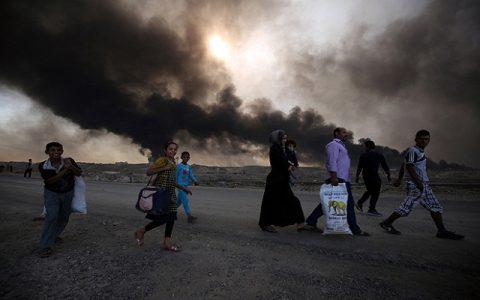
ISIS set fire to sulphur fields, creating toxic gas clouds that injure 1,000
Fears of mass casualties have grown amid concern Islamic State could have access to hundreds of thousands of tonnes of toxic chemicals.
The Islamic State group has injured over 1,000 people by creating toxic clouds caused by burning sulphur fields, as the militant group desperately attempts to cling to control of Mosul in the face of a military onslaught from the Iraqi army and Kurdish forces.
Late last week IS began to burn oil and sulphur at wells in Qayyarah – an Iraqi town some 30km south of Mosul – as the pressure intensifies on the militant group.
The sulphur gas released by the fires has endangered the lives of thousands of civilians, leading military commanders to raise fears about the group increasing its chemical attacks.
“As the assault on Mosul begins its final and decisive stages there is increased concerns about ISIS chemical gas usage,” Hamish de Bretton-Gordon told MEE.
De Bretton-Gordon is the former commanding officer of the UK Chemical, Biological, Radiological and Nuclear (CBRN) Regiment and Nato’s Rapid Reaction CBRN Battalion, who now advises Kurdish Peshmerga forces and NGOs on chemical attacks.
“IS carried out at least 20 chemical attacks in the last months with mustard gas and chlorine,” he said, adding that this is the first time that IS is burning sulphur fields.
“It is generally accepted that IS will use all weapons to defend Mosul including their extensive chemical weapons stockpile. The Peshmerga [Kurdish forces] in particular believe that IS intends to blow up the Mishraq chemical complex 30km south of Mosul in face of the Iraqi army and Peshmerga advances. This facility and sulphur mine contains hundreds of thousands of tonnes of toxic chemical,” he said.
On Thursday IS started to burn sulphur fields at the Mishraq chemical complex, creating toxic hydrogen clouds hurting over 1,000 civilians and security forces who are now receiving medical treatment.
“Mishraq is already on fire, US troops are in gas masks and over 1,000 casualties are reported,” de Bretton-Gordon said.
Hundreds of people have been admitted to the nearby Qayyara central hospital with respiratory problems since Friday, hospital director Abdul Salam Jabbouri told Reuters on Saturday.
Source: /Middle East Eye





